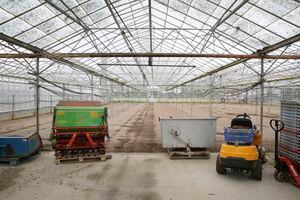Fresh Guernsey Herbs shuts as business has ‘run its course’
THE closure of Fresh Guernsey Herbs marks another casualty in the protracted demise of the island’s troubled horticultural industry.

Fresh Guernsey Herbs was a diversification from tomatoes and, for 30 years, it supplied a large part of the island’s herbs as well as its main market exporting to the UK.
Founded by Sue and Ian Lloyd, former tomato growers, the business rented numerous vineries at its height before slowly cutting back in recent years to the Les Abreuveurs site at the family home near Aladdin’s Cave.
Former manager Siegi Moherndl said he was not sure what would happen with the vinery now but it was in good working order.
At the height of growing in Guernsey there were more than 1,000 acres of greenhouse and in excess of 5,000 workers – in 1967 that was over 30% of the male workforce.
Fresh Guernsey Herbs officially stopped trading on 31 October, when its last stock ran out.
‘After 30 years of trade we shut our doors officially at the end of October,’ said Mr Moherndl.
‘The main reason being we were a big exporting business and, due to competition elsewhere, and freight charges, that reduced over the years.
‘Staff and shareholders came to an agreement that we had run our course in the herb industry and decided to call it a day.’
Mr Moherndl said that Mr and Mrs Lloyd, coming out the back end of the tomato boom, found a niche market in herbs and for 25 years trading was good.
The company would like to thank Waitrose and other firms it supplied for their understanding during this period.
‘It is the sad part about the local horticultural industry, what once thrived no longer exists,’ said Mr Moherndl.
The Guernsey Growers Association shut its doors at the end of 2014 after 120 years of service because there were not enough growers to warrant the association being in place.
The island went from the sale of a gross annual tonnage in tomatoes in 1966 of 57 tonnes – about 60% of the UK market – to just 1.8 tonnes or 0.7% of the UK market in 1996.





